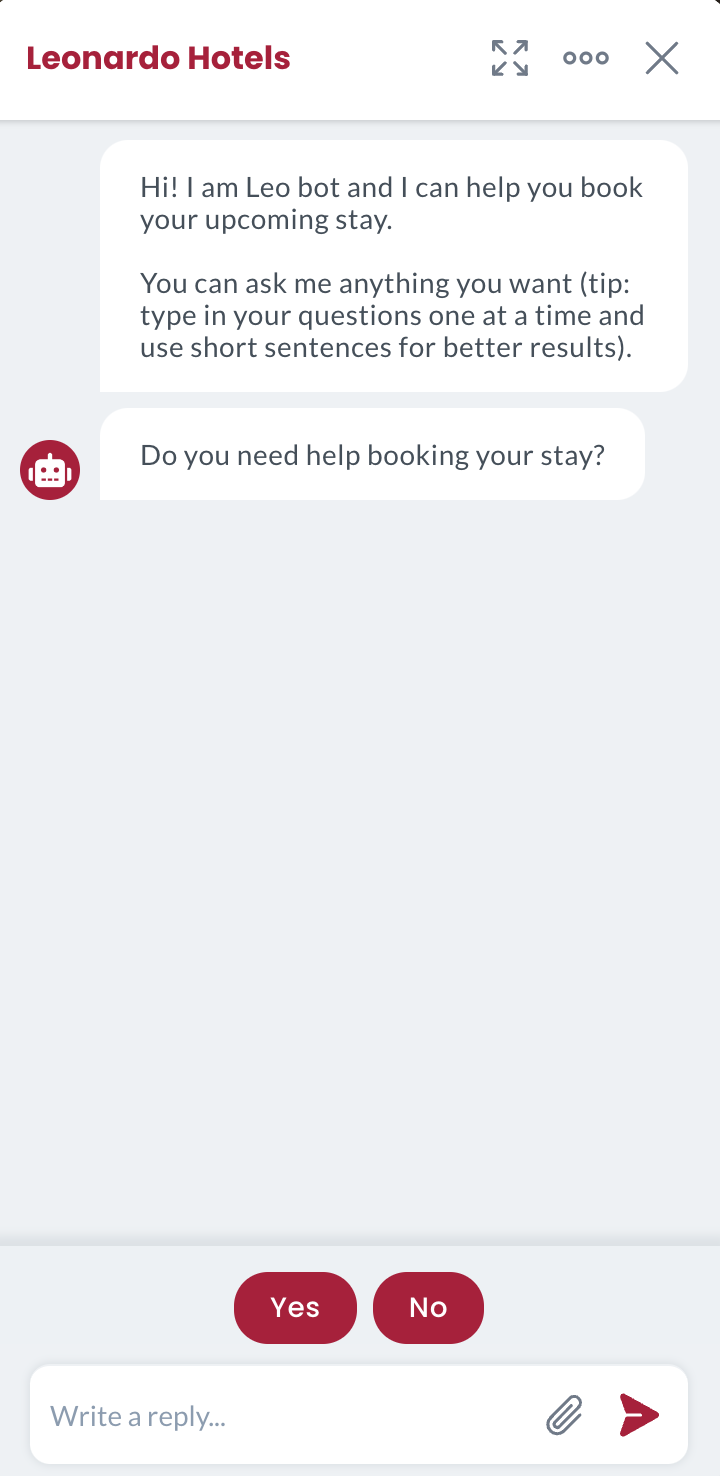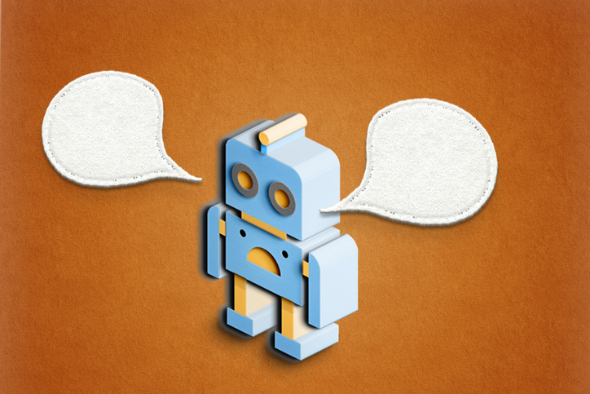What is a hotel chatbot?
A hotel chatbot is a type of software that is used to replicate a conversation between the property and a potential guest on the hotel’s website. The chatbot is designed to ask and answer common questions, so it can help guests find the information they need and make a booking decision.
This means the hotel can automate instant and personal communication with potential guests, increasing the amount of reservations and reducing the amount of abandoned bookings.
Many hotel chatbots can also be used on a property’s social media accounts and apps such as Facebook, Instagram, or GoogleMyBusiness.
Integrate hotel chatbots to run processes more smoothly
Easily implement a chatbot to your website with Little Hotelier's partner integrations and apps, streamline daily operations, and increase hotel bookings.
Try for freeChatbot vs Hotel live chat
It’s important to note that a hotel chatbot is not the same as hotel live chat. A hotel chatbot is completely automated and is either run by artificial intelligence (AI) or from pre-defined rules, whereas live chat still connects a user to a real customer service representative.
Typically, this means responses from a chatbot are much faster and it takes the pressure off small hotels which don’t have the staff capacity to monitor live chat.
Both tools will help improve guest experience, but a chatbot is ultimately more efficient for hotels who are still battling staffing issues within the industry.
Read the rest of the article for a full guide to hotel chatbots, including how to implement one on your property’s website for a boost to direct bookings.

How common are chatbots in the hotel industry?
Chatbots are on the rise in the hotel industry, with data from Statista showing that independent hotels increased their use of chatbots by 64% in recent years.
We can also see that chatbots are becoming more popular in general, given 88% of consumers had an interaction with one in the previous year.
Hotels can often be slow adopters of new technology, leaving some guests frustrated. Lessons can be learned from another ‘property’ industry, the real estate industry, which is one of the biggest users of chatbots and sees great success in helping to sell and rent properties, and solve customer enquiries. Hotels can take the same approach to selling rooms, upselling guests, and selling extras.
Here’s what you need to know…
Hotel booking chatbot: How does it work?
In most cases your hotel chatbot will either be AI-generated or rule-based, and helps with the booking process by conversing with website visitors and answering their queries. Responses are based on learning algorithms and existing knowledge.
A chatbot works as a virtual booking assistant, operating particularly well when faced with frequently asked questions (FAQs). It provides guests with information on availability, pricing, amenities, services, and the booking process itself.
Chatbots will appear to guests in a few different ways:
- It can be a widget, like a speech bubble, in the bottom corner of your site
- It can be a landing page that removes all other distractions
- It can be a pop-up that is triggered by certain actions
- It can be embedded on particular parts of your website
Most commonly, hotels use widgets to display their chatbots since they are not intrusive and can be easily implemented across the entire website.

How does conversational AI hotel chatbot work?
Conversational AI hotel chatbot works by communicating with guests using Natural Language Processing (NLP). The AI chatbot learns to understand questions and trigger the correct response. Because it learns with each new interaction, its ability to drive bookings for your hotel will always be improving.
The main benefit of investing in a conversational AI hotel chatbot is the learning capability. If the provider has a significant customer base, the AI chatbot will experience new customer interactions regularly and learn from them, meaning its performance on your own website will be improved by the collective experience.
For example, conversational AI hotel chatbots can provide instant responses to queries round the clock and suggest additional services based on guest preferences. By reducing wait times and leveraging upselling opportunities, AI chatbots can enhance customer satisfaction and increase hotel revenue.
How does a rule-based chatbot work?
A rule-based chatbot will work from conversation flows that you provide to it, asking and answering queries from a set of instructions.
For example, when a visitor lands on your website the chatbot’s first question may be “Do you have a reservation with us?” If the user answers “no”, the chatbot may then ask “would you like to check availability and view rooms?” If the answer is yes, then you’re already on your way to converting a booking. If the answer is “no” once more, then the chatbot could list a few options of what the user would like to talk about such as amenities, current offers or promotions, events, dining options, and more.
The benefit here is that you can create powerful conversational flows and control the direction that conversations might take.
Best examples of a hotel chatbot
The best hotel chatbot will be one that has been designed specifically for the hotel or hospitality industry, with the hotel booking and sales funnel in mind. The more pre-programmed knowledge of the industry, the better equipped the bot will be to communicate with your current and future guests.
Another way to identify the best chatbot for your hotel is to look at what services the provider has to offer. Is the chatbot one dimensional or can it serve many different purposes? For example, you may want a chatbot that can be a booking assistant, virtual concierge, and virtual room service.
Little Hotelier’s online booking engine is connected to a couple of the industry’s leading hotel chatbots in HiJiffy and Book Me Bob.
HiJiffy
HiJiffy is an AI-powered solution that helps hoteliers connect with their guests and drive revenue. Part of this is a hotel chatbot which operates as a booking assistant and virtual concierge, automating many of the initial interactions that a guest may have with your hotel.
Operating for nearly a decade, HiJiffy is rated 9.3/10 on HotelTechReport and serves more than 1600 hotels worldwide.
Book Me Bob
Book Me Bob is another AI powered bot that is designed to nurture guests from the beginning of their online journey right through to their experiences at the hotel. It helps to drive direct bookings, take a load off staff, deliver actionable insights, and satisfy guests.
Book Me Bob also has flexible pricing plans that match up with specific property types, from resorts and hotels through to small vacation rentals.
How effective is a hotel reservation chatbot?
Chatbots have proven to be very effective for businesses looking to boost direct reservations, reduce costs, and offer customers convenience. Because they are fast, operating 24/7, and can be multilingual, chatbots are like a super-powered member of staff.
Not only can chatbots reduce customer service costs by up to 30%, it’s also been found that 40% of consumers prefer to deal with automated services.
Some more compelling stats we found show that:
- 69% of consumers were satisfied with their last interaction with a chatbot, while only 10% were dissatisfied
- The conversion rate of chatbots in some industries has been measured at 70%
- Chabot transactions in eCommerce are expected to reach $112 billion this year (2023)
- Online businesses have been able to grow revenue by 7-25% using chatbots
- Chatbots have the potential to increase direct bookings by 30%
Knowing that a chatbot is a viable solution for your accommodation business, the final thing you need to know is…
How to implement a hotel chatbot on your website
Your hotel website is where the direct booking magic happens, and also where your customer service comes to the fore. Implementing a chatbot to help with this is a lot easier than you may think.
Today, there are many dedicated hotel chatbot providers that will integrate directly with your website and/or online booking engine. It is recommended that you work with one of these specialists to implement your chatbot, as it will make the process quick and simple for you.
When it comes to choosing the best chatbot for your business there are plenty of factors to consider, such as:
- The ability to operate in real-time
- Customisation so you can optimise the bots performance
- The ability for the bot to analyse data and provide useful insights
- Multilingual capability to serve guests from around the world
- Features that allow the bot to display not only text, but links and other files
- A function to connect the guest to a real person if necessary
- Being able to operate across different platforms such as social media
- A conversational tone and vocabulary
- Seamless integrations with your existing systems
Perhaps what all this boils down to is making sure that you implement a chatbot via a provider who fully understands what it means to run and operate a hotel, and what problems need to be solved.
Get more bookings by connecting a hotel chatbot with Little Hotelier
Little Hotelier is an all-in-one technology solution that has been designed specifically for small hotels and accommodation providers.
With automation and integration prioritised, you won’t just boost bookings and profit at your hotel, you’ll also have more time, freedom, and control – leading to a better experience for your guests and a happier lifestyle for yourself.
One of Little Hotelier’s included features is a hotel booking engine, which you can also use to easily increase direct bookings on your website. Additionally, you can further optimise performance by choosing to connect your booking engine with two of the industry’s leading hotel chatbots – HiJiffy or Book Me Bob.
Interested in a 63x return on investment and an extra 35 minutes saved per booking?
Try Little Hotelier completely free for 30 days and gain access to a whole range of powerful features, including your chosen hotel chatbot.
By Dean Elphick
Dean is the Senior Content Marketing Specialist of Little Hotelier, the all-in-one software solution purpose-built to make the lives of small accommodation providers easier. Dean has made writing and creating content his passion for the entirety of his professional life, which includes more than six years at Little Hotelier. Through content, Dean aims to provide education, inspiration, assistance, and, ultimately, value for small accommodation businesses looking to improve the way they run their operations (and live their life).
Table of contents
“Our accommodations are perfectly taken cared of, thanks to Little Hotelier. It's now easier to get real-time info! Payments are easily traced too.”
General Manager, Marina View Chalets








